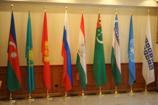 The year 2009 marks the 15th anniversary of UNODC's full-fledged presence in Central Asia. Now, 15 years after the establishment of the UNODC Regional Office for Central Asia in 1993, UNODC has offices with ongoing project activities in all the Central Asian states and Azerbaijan.
The year 2009 marks the 15th anniversary of UNODC's full-fledged presence in Central Asia. Now, 15 years after the establishment of the UNODC Regional Office for Central Asia in 1993, UNODC has offices with ongoing project activities in all the Central Asian states and Azerbaijan.
UNODC's programme portfolio has almost tripled in volume and coverage. It has grown from few projects in 1993 to 26 million dollars in 2004, to almost 70 million dollars in 2009, and it continues to expand. With a heavy emphasis on counter-narcotics assistance, the Regional Office manages an integrated program that links major national counter-narcotics projects in every country in the region with regional projects focusing on intelligence-led investigations and regional cooperation, including the Central Asia Regional Information and Coordination Centre (CARICC), precursor controls, Computer-Based Training (CBT), controlled deliveries and border liaison offices. National projects focus on the establishment of dedicated drug law enforcement bodies, such as Drug Control Agencies, border security and mobile interdiction units.
It was just 15 years ago that the Central Asian states started engaging in drug control cooperation by establishing their first national drug control institutions and competent authorities, developing legal bases for drug control in line with the United Nations drug control conventions and protocols, and fine-tuning national strategies and action plans. Now, Central Asian governments have significantly advanced in all these areas. Development of the Memorandum of Sub-Regional Drug Control Cooperation of 4 May 1996 between the Central Asia states, the Aga Khan Development Network and UNODC was a milestone in the establishment of a regional cooperation framework in the Central Asian region and beyond. Azerbaijan and the Russian Federation subsequently joined the MOU. UNODC is proud of being part of these efforts and implements a number of regional activities in the context of the MOU.
During these past 15 years, UNODC has enjoyed continuous support by and recognition from international partners. It is with great appreciation, therefore, that UNODC would like to acknowledge the role of the European Commission, the informal initiative of the Foreign Anti-Narcotics Community (FANC), the NATO-Russia Council, the Mini-Dublin Group in Central Asia, OCHA, the OSCE, the Supreme Court of Uzbekistan, CARHAP, UNDP, UNOHCHR, UNICEF, the UN Regional Centre for Preventive Diplomacy for Central Asia, WHO, the World Bank as well as the donor countries and organizations that made this success possible.